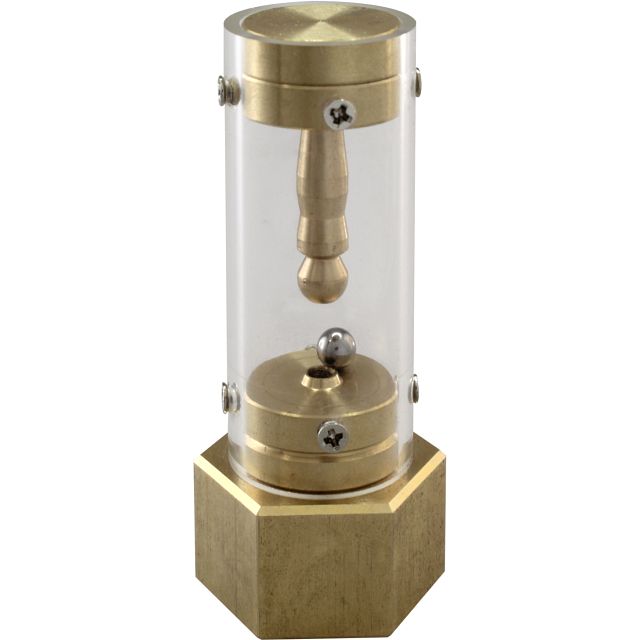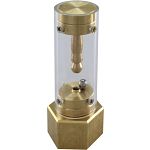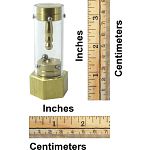Houdini's Torture Cell Puzzle
- Wholesale SKU
- PM175
- Object
- Free Houdini from The Torture Cell
- Difficulty
- Level 8 - Demanding
- Brand
- Puzzle Master
- Dimensions
- Approx. 7.9 cm x 3.5 cm x 3 cm/ 4.5 in x 4.9 in x 1.4 in
- Packaging
- Cardboard Box
To free Houdini from his cell you’ll have to discover the tools and work out how to use them. One feature that Brian builds into many of these types of sequential discovery puzzles is to give you something to find almost immediately; better to maintain interest in the puzzle. You’ll find that with this puzzle too. Yes, there are lots of magnets in the puzzle but no “hitting” or “banging” is necessary to solve it. There is a tool to discover for every aspect of the solve.
The idea for Houdini’s Torture Cell came from one of the locks in the incredibly complex The Opening Bat puzzle (part of the Sold Out Limited Edition 2010 series). Brian felt the idea was unique and very satisfying to solve so he revisited the idea and made a separate puzzle. Unlike The Opening Bat where the puzzle was completely hidden inside, this puzzle has been presented in such a way that most elements of the puzzle are visible to you. The puzzle is to then work out how to use those tools to solve it. You can literally sit and think about the solution without even touching the puzzle.
WINNER: One of two Jury First Prizes given in the Nob Yoshigahara Puzzle Design Competition 2012 at IPP in Washington, USA in 2012.
Peter Hajek also considered the mechanism worthy of mentioning in his new book “Enter If You Can”. Published in 2021 this is a comprehensive look at secret opening puzzle boxes and puzzle locks throughout history up to the present day. A must-read!
Size of puzzle: 80mm high and the hex nut at the bottom is 35mm across the diagonal.
 Write your own review
Write your own review
5 out of 5 stars
-
If you understand magnets, you will understand two ways to solve this puzzle. Fast or slow way to victory. Good luck.★★★★★Tuesday July 2nd Miroslav SLOVAKIA wrote,
-
Very nice piece of craftsmanship and a very cool mechanism - worth every penny.★★★★★Thursday June 27th OhPuzz wrote,
-
Very cool little puzzle that makes you feel much smarter than you are when you figure it out. My whole household had a great time playing with this★★★★★Wednesday May 1st TJ wrote,
-
For the price point it is hard to beat this little gem! Really fun and satisfying solve.★★★★★Thursday February 29th Jeff Strider wrote,
-
A quite striking puzzle once in hand. It is well made and has an interesting resolution★★★★★Saturday November 4th Dámaso de Damasco wrote,
-
A beautiful puzzle to display! I leave it on my desk and ask all my coworkers to try it. I wouldn’t say it’s a level 8…more of a 6 to me. That being said I’m still very happy to have this and the solution is very enjoyable! Id recommend :)★★★★★Thursday December 22nd Tessa wrote,
-
Really fun little puzzle, nice to have on display. Has a few different ways to solve it, which is interesting.★★★★★Sunday November 20th mzb wrote,
-
very well made. not hard to solve.★★★★★Tuesday November 15th john wrote,
-
Two words. GET IT!!!!! Great idea, fantastic design, nicely put together, will provide a couple of A-HA moments! Highly recommended!★★★★★Wednesday October 12th Paschalis Antoniou wrote,
-
Brilliant! Absolutely love the design, feel, solve, and mechanics. A keeper for sure!★★★★★Thursday September 22nd Peter wrote,
-
My kind of puzzle. A thing of beauty and a pleasure to solve. Wish they made more like this!★★★★★Thursday September 15th P. Heller wrote,
-
Fantastic puzzle, there is a reason this puzzle won awards. Craftsmanship could be improved but for the price you pay its well worth its value.★★★★★Tuesday September 6th Jordan wrote,





 Watch video review!
Watch video review!